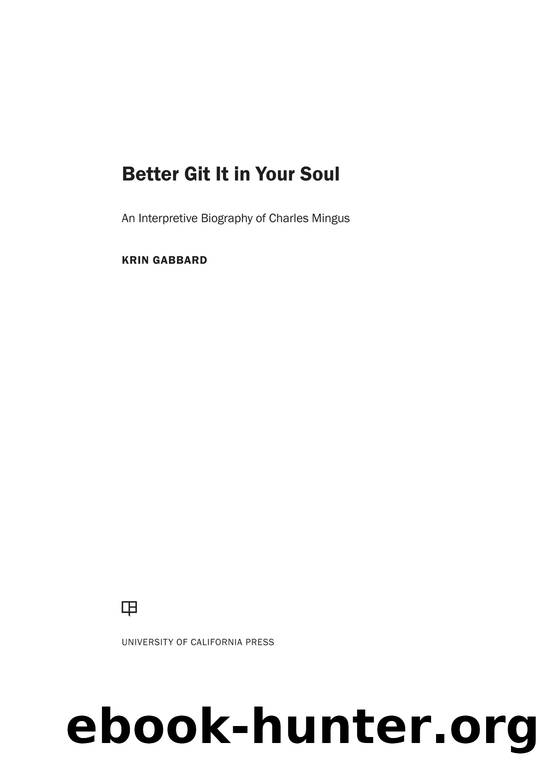Better Git It in Your Soul: An Interpretive Biography of Charles Mingus by Krin Gabbard

Author:Krin Gabbard [Gabbard, Krin]
Language: eng
Format: azw3
ISBN: 9780520260375
Publisher: University of California Press
Published: 2016-02-07T16:00:00+00:00
PART III
Third Stream Music and the Rest of Jazz History
In Beneath the Underdog, Mingus portrays himself as a complex individual searching for self-knowledge. We should not, therefore, be surprised by the many contradictory statements that have been attributed to him. An especially astonishing moment came in a 1964 radio interview with Nat Hentoff, when he said: “I’m probably the world’s worst lover there is.”1 Yet in his autobiography he consistently portrays himself as irresistible to women, only partly because of the skills he learned from Pop Collette. And as recently as the year before the interview he had written about having sex with twenty-three Mexican prostitutes, all in one night.2
Similarly, he told Nel King that he had “never read a book—any book—since his religious readings at about age sixteen,”3 but the evidence of his reading is everywhere, both in his writings and in his song titles. Mingus did not want to be pigeonholed or associated with only one aspect of his career. He would even object when someone labeled him a “jazz musician.”4 And when he speaks on the Charles Mingus Presents Charles Mingus LP, he introduces “All the Things You Could Be By Now if Sigmund Freud’s Wife Were Your Mother” by carefully pronouncing the entire title twice and then saying that it means nothing. His almost perverse set of disavowals, at one point or another denouncing even Beneath the Underdog as well as his superb impulse! recordings, was surely related to his search for an identity that might suit him.
When it came to race, Mingus was just as unwilling to be classified, occasionally speaking of his desire to associate with “the raceless set.”5 He knew that white people in the United States had convinced themselves that they had no race but that African Americans did. For better or worse, African Americans have built communities—or have been forced into communities—because of this racial divide. Because of his mixed race background, however, Mingus was never able to settle comfortably into either white or black society. He often denounced white people, but he had close friends who were white, and he hired many white musicians.
Most of all he hated racism, regardless of where it came from. On this point at least he was consistent. Trumpeter Jack Walrath has spoken eloquently about the time Mingus revealed his commitment to integration when the band was touring in 1975 and Walrath was the only white member of the group. “He always wanted to go to Africa, and some people wanted him to play in a festival there but told him to leave the ‘white boy’ (me) at home. He promptly told them to go fuck themselves. . . . He denounced racism, whether it came from Orval Faubus or Idi Amin.”6
Mingus was also consistent in his conviction that “it’s all one music,” a statement he made in a letter to Ralph Gleason in 1951, just after settling in New York at the age of twenty-nine.7 Mingus knew that jazz and classical music were kept separate by racist notions of virtuosity and genius.
Download
This site does not store any files on its server. We only index and link to content provided by other sites. Please contact the content providers to delete copyright contents if any and email us, we'll remove relevant links or contents immediately.
| Classical | Country & Folk |
| Heavy Metal | Jazz |
| Pop | Punk |
| Rap & Hip-Hop | Rhythm & Blues |
| Rock |
Cecilia; Or, Memoirs of an Heiress — Volume 3 by Fanny Burney(31431)
Cecilia; Or, Memoirs of an Heiress — Volume 2 by Fanny Burney(31374)
Fanny Burney by Claire Harman(26215)
We're Going to Need More Wine by Gabrielle Union(18591)
Plagued by Fire by Paul Hendrickson(17073)
Cat's cradle by Kurt Vonnegut(14697)
All the Missing Girls by Megan Miranda(14532)
Bombshells: Glamour Girls of a Lifetime by Sullivan Steve(13658)
Leonardo da Vinci by Walter Isaacson(12749)
4 3 2 1: A Novel by Paul Auster(11745)
For the Love of Europe by Rick Steves(11316)
Adultolescence by Gabbie Hanna(8565)
The remains of the day by Kazuo Ishiguro(8341)
Note to Self by Connor Franta(7434)
Diary of a Player by Brad Paisley(7236)
Giovanni's Room by James Baldwin(6752)
What Does This Button Do? by Bruce Dickinson(5917)
Born a Crime by Trevor Noah(5053)
The Kite Runner by Khaled Hosseini(4924)
